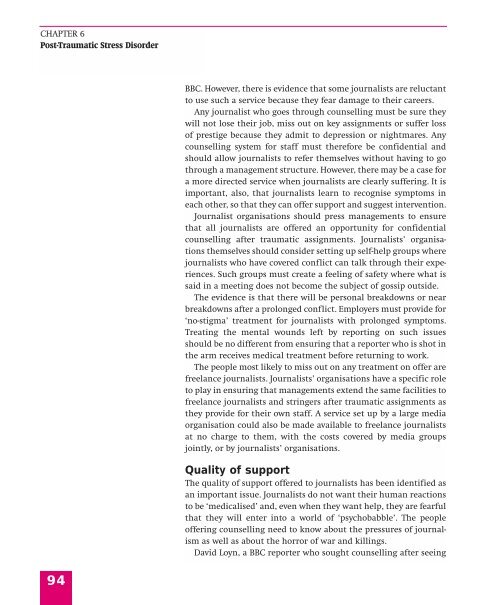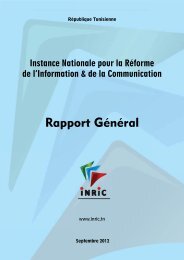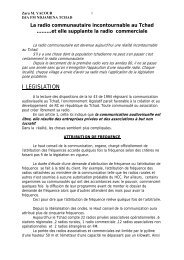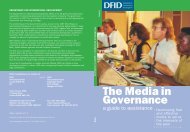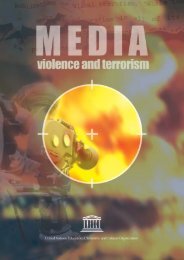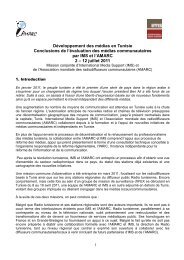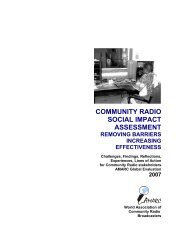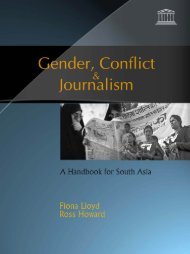CHAPTER 6Post-Traumatic Stress DisorderBBC. However, there is evidence that some journalists are reluctantto use such a service because they fear damage to their careers.Any journalist who goes through counselling must be sure theywill not lose their job, miss out on key assignments or suffer loss<strong>of</strong> prestige because they admit to depression or nightmares. Anycounselling system for staff must therefore be confidential andshould allow journalists to refer themselves without having to gothrough a management structure. However, there may be a case fora more directed service when journalists are clearly suffering. It isimportant, also, that journalists learn to recognise symptoms ineach other, so that they can <strong>of</strong>fer support and suggest intervention.Journalist organisations should press managements to ensurethat all journalists are <strong>of</strong>fered an opportunity for confidentialcounselling after traumatic assignments. <strong>Journalists</strong>’ organisationsthemselves should consider setting up self-help groups wherejournalists who have covered conflict can talk through their experiences.Such groups must create a feeling <strong>of</strong> safety where what issaid in a meeting does not become the subject <strong>of</strong> gossip outside.The evidence is that there will be personal breakdowns or nearbreakdowns after a prolonged conflict. Employers must provide for‘no-stigma’ treatment for journalists with prolonged symptoms.Treating the mental wounds left by reporting on such issuesshould be no different from ensuring that a reporter who is shot inthe arm receives medical treatment before returning to work.The people most likely to miss out on any treatment on <strong>of</strong>fer arefreelance journalists. <strong>Journalists</strong>’ organisations have a specific roleto play in ensuring that managements extend the same facilities t<strong>of</strong>reelance journalists and stringers after traumatic assignments asthey provide for their own staff. A service set up by a large mediaorganisation could also be made available to freelance journalistsat no charge to them, with the costs covered by media groupsjointly, or by journalists’ organisations.Quality <strong>of</strong> supportThe quality <strong>of</strong> support <strong>of</strong>fered to journalists has been identified asan important issue. <strong>Journalists</strong> do not want their human reactionsto be ‘medicalised’ and, even when they want help, they are fearfulthat they will enter into a world <strong>of</strong> ‘psychobabble’. The people<strong>of</strong>fering counselling need to know about the pressures <strong>of</strong> journalismas well as about the horror <strong>of</strong> war and killings.David Loyn, a BBC reporter who sought counselling after seeing94
<strong>Live</strong> <strong>News</strong> — A <strong>Survival</strong> <strong>Guide</strong> for <strong>Journalists</strong>someone summarily executed, warned at the London conference:“I know there are other people who do <strong>of</strong>fer this kind <strong>of</strong> counsellingand I would appeal to the psychotherapeutic community tomake sure that it’s the right kind <strong>of</strong> counselling and that it’s veryspecific and very tightly targeted. Otherwise, it’s going to get a badname in the journalism business.”Psychotherapist Gabrielle Rifkind also cautioned against ‘quickfix-it’ solutions, calling instead for efforts to build an emotionallyliterate culture. “It’s not the level <strong>of</strong> trauma that’s the problem,”said Rifkind, “it’s the question <strong>of</strong> how that trauma is processed,and that’s why self-awareness becomes important.”<strong>International</strong> moves to improve knowledgeA number <strong>of</strong> initiatives are under way to improve knowledge <strong>of</strong>post-conflict stress. The London conference, Emotions, Trauma andGood Journalism, called for a European Centre for Journalism andTrauma to be established with a brief to <strong>of</strong>fer life skills trainingand therapy, to campaign and to organise research. Just such aCentre is now being set up in partnership between the BBC and theDart Center for Journalism and Trauma, based at the University <strong>of</strong>Washington in Seattle in the United States. Dart Europe is directedby Mark Brayne, who was for 20 years a foreign correspondent forReuters and the BBC, with postings in Moscow, Berlin, Vienna andBeijing. Amongst other assignments, he covered the build-up to thekillings in Tiananmen Square in 1989, the revolution in Romaniaand beginnings <strong>of</strong> war in Yugoslavia.In the 1990s, Mark Brayne trained as a psychotherapist, graduatingin 2000 with a Masters degree and a research thesis into thePersonal Experience <strong>of</strong> the Foreign Correspondent. As editor withthe European languages sections <strong>of</strong> the BBC World Service, MarkBrayne has been a driving force behind the provision <strong>of</strong> compulsorysurvival training for reporters and producers working in hostileenvironments and areas <strong>of</strong> natural disaster. He helped to establishthe BBC’s first confidential counselling service in the early 1990s.The Media Diversity Institute is planning events in Central andEastern Europe to promote a climate <strong>of</strong> understanding about howtrauma affects news gatherers. The aims are to build PTSD intoexisting programmes for journalists’ education about workingwith victims <strong>of</strong> violence and trauma, and to promote a climate <strong>of</strong>understanding about how trauma affects news people. ■‘Ultimatelythis is aboutbetter journalism’“Ultimately this is aboutbetter journalism. This isabout enabling journalists topresent a better picture <strong>of</strong>the world back to thosethey serve. It’s aboutchanging the culture withinorganisations where we canencourage journalists torecognise that they do havean emotional response towhat they’re doing and it’sokay to talk about it.Perhaps, ultimately, with theaim that journalists will beso healthy in theirapproach, that they won’tneed to take their problemsto specialists becausethey’ll be able to process itas they go along, with theircolleagues."My understanding <strong>of</strong> this isthat if I am more self-awareas a journalist, if I have agreater emotional armourywithin myself, and anawareness <strong>of</strong> that armoury, Ican use those internal toolsto tell a better story; and amore authentic story. ■Mark Brayne, speaking atthe London conference,Emotions, Trauma and GoodJournalism.95


